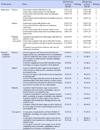Abstract
Purpose
It is expected that there will be a difference in job stress between special unit (operating room, anesthesia room) nurses and general ward nurses in general hospitals, but factors influencing job stress have not been examined. This study reports on research to examine the sources of verbal abuse in the workplace.
Methods
Participants were 243 nurses (special unit 112, general ward 132) working in a hospital in I city. Data collection period was March 18 to March 25, 2016 and questionnaires were used to collect data. Comparison of differences in influence of verbal abuse on job stress between special unit and general ward nurses was analyzed with multiple hierarchical regression.
Results
In special unit nurses, verbal abuse from doctors and/or nurses influenced their job stress (Adj. R2=.545). In general ward nurses, verbal abuse from patients and/or care-givers influenced their job stress (Adj. R2=.241).
Conclusion
Findings indicate a need to campaign for increase respect among nurse-doctor, nurse-nurse, and nurse-patients/care givers because verbal abuse from doctors, nurses, and patients/care-givers causes negative attitudes in nurses. General ward nurses in particular should provide sufficient explanation to patients about nursing services because verbal abuse from patients/care-givers is related to their complaints about nursing care.
Figures and Tables
Table 1
General Characteristics of Nurses, and Correlation between Verbal Abuse Experience and Job Stress

Table 3
Verbal Abuse and Job Stress according to General Characteristics of Special Unit Nurses (N=112)

References
1. Huber D. Leadership and nursing care management. 5th ed. St. Louis, Missouri: Elsevier;2014.
2. Buback D. Assertiveness training to prevent verbal abuse in the OR. AORN J. 2004; 79(1):148–150. 153–158. 161–164. DOI: 10.1016/S0001-2092(06)61149-6.
3. Rowe MM, Sherlock H. Stress and verbal abuse in nursing: do burned out nurses eat their young? J Nurs Manag. 2005; 13(3):242–248. DOI: 10.1111/j.1365-2834.2004.00533.x.
4. Joubert E, du Rand A, van Wyk N. Verbal abuse of nurses by physicians in a private sector setting. Curationis. 2005; 28(3):39–46. DOI: 10.4102/curationis.v28i3.979.
5. Kwon HJ, Kim HS, Choe KS, Lee KS, Sung YH. A study on verbal abuse experienced at medical centers. J Korean Clin Nurs Res. 2007; 13(2):113–124.
6. Edward KL, Stephenson J, Ousey K, Lui S, Warelow P, Giandinoto J-A. A systematic review and meta-analysis of factors that relate to aggression perpetrated against nurses by patients/relatives or staff. J Clin Nurs. 2016; 25(3-4):289–299. DOI: 10.1111/jocn.13019.
7. Lee SH, Chung SE. Nurses' experience of verbal violence in hospital setting. J Korean Acad Nurs Adm. 2007; 13(4):526–536.
8. Oh EJ, Kim YS. A study on the relationship between upperscale general hospital nurses' experience of verbal abuse and job stress. Korean J Occup Health Nurs. 2015; 24(3):173–182. DOI: 10.5807/kjohn.2015.24.3.173.
9. Yoo MO. Influences of verbal abuse on job stress and organizational commitment of nurses [master's thesis]. Chungju: Chungju National University;2012.
10. Joung SA, Park KY. Influence of experiencing verbal abuse, job stress and burnout on nurses' turnover intention in hemodialysis units. J Korean Acad Nurs Adm. 2016; 22(2):189–198. DOI: 10.11111/jkana.2016.22.2.189.
11. Lim EJ, Yi YJ. Comparison of operating room nurses and general ward nurses on communicative competence and interpersonal relationship ability within the medical team. J Korean Acad Nurs Adm. 2014; 20(3):313–321. DOI: 10.11111/jkana.2014.20.3.313.
12. Im SI, Park J, Kim HS. The effects of nurse's communication and self-leadership on nursing performance. Korean J Occup Health Nurs. 2012; 21(3):274–282. DOI: 10.5807/kjohn.2012.21.3.274.
13. Lee HS. The effect on the turnover intention and nursing performance to the emotional reaction after the violence that nurses experience [master's thesis]. Suncheon: Sunchon National University;2015.
14. Lee DS. A study of development and standardization to measure job stress in Korea [dissertation]. Chuncheon: Hallym University;1999.
15. Choi MK. Study among verbal abuse, burn out, organizational commitment in nurses working in acute hospitals [master's thesis]. Asan: Soonchunhyang University;2014.
16. Kim HS, Yim HW, Jeong SH, Jo SJ. An association among verbal abuse, social support and turnover intention for special unit nurses in a hospital. Korean J Occup Environ Med. 2009; 21(4):388–395.
17. Cho YH, Hong YR, Lee AM, Kim MK, Lee HJ, Han AK, et al. Experience of verbal abuse, emotional response, and ways to deal with verbal abuse against nurses in hospital. Korean J Occup Health Nurs. 2011; 20(3):270–278. DOI: 10.5807/kjohn.2011.20.3.270.
18. Nam KD, Yoon KS, Chung HS, Park SA, Jang BY, Kim HR, et al. A study on the development of verbal abuse scale for operating room nurses. J Korean Acad Nurs Adm. 2005; 11(2):1–27.
19. Lee BJ, Kim MU. An exploratory investigation on conflicts between physicians and nurses: Types, causes, and asymmetry. Korean J Ind Organ Psychol. 2012; 25(1):1–25.
20. Yom YH, Koh MS, Kim KK, Kim BY, Min S, Shin MJ, et al. Nursing management. 7th ed. Seoul: Soomoonsa;2017.
21. Nam KD, Yoon KS, Chung HS, Park SA, Jang BY, Sung YH. Verbal abuse of operating nurses by physicians and other nurses. J Korean Acad Nurs Adm. 2006; 12(3):343–354.
22. Brewer CS, Kovner CT, Obeidat RF, Budin WC. Positive work environments of early-career registered nurses and the correlation with physician verbal abuse. Nursing Outlook. 2013; 61(6):408–416. DOI: 10.1016/j.outlook.2013.01.004.
23. Budin WC, Brewer CS, Chao YY, Kovner C. Verbal abuse from nurse colleagues and work environment of early career registered nurses. J Nurs Scholarsh. 2013; 45(3):308–316. DOI: 10.1111/jnu.12033.
24. Kim JW, Ko SJ, Shin SH. The effects of verbal violence experience, social support, and coping patterns on job stress among operating room nurses. J Korean Clin Nurs Res. 2016; 22(1):38–45.
29. Nam IS. A Study on verbal abuse at a neurosurgery ward: From the Perspective of Nurses [master's thesis]. Seoul: Kyung Hee University;2015.




 PDF
PDF ePub
ePub Citation
Citation Print
Print





 XML Download
XML Download